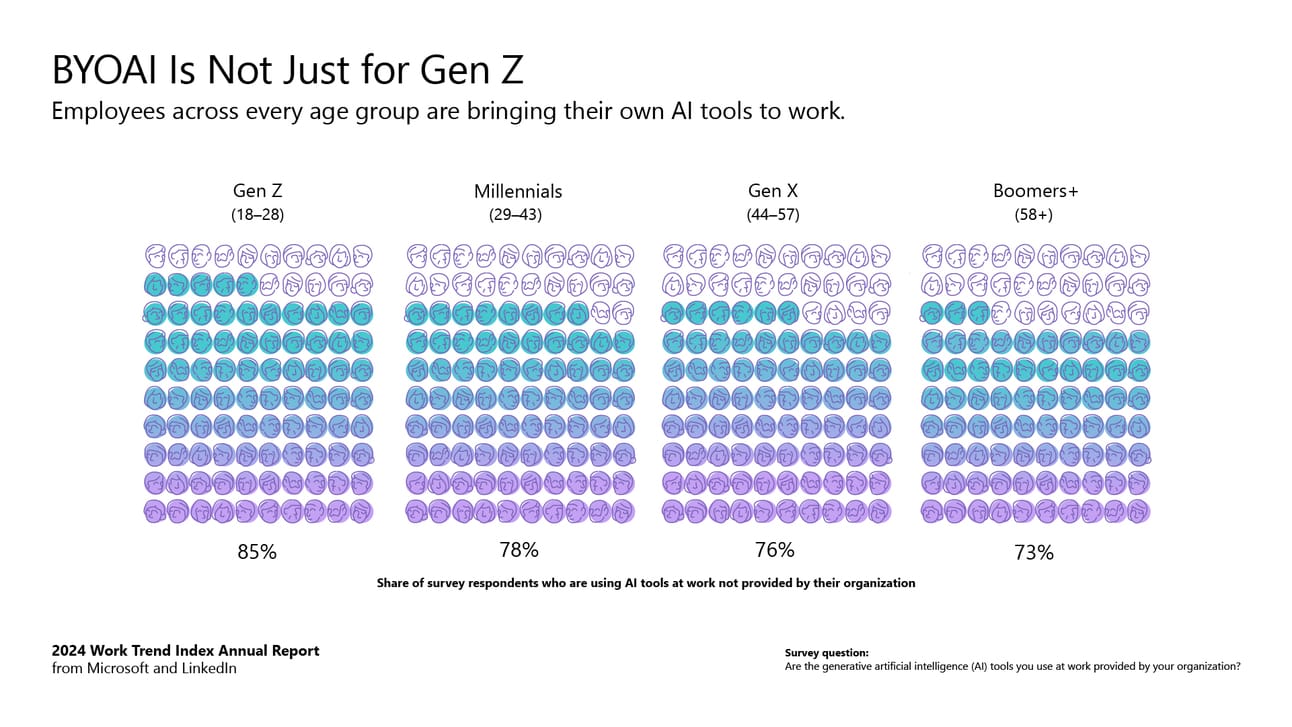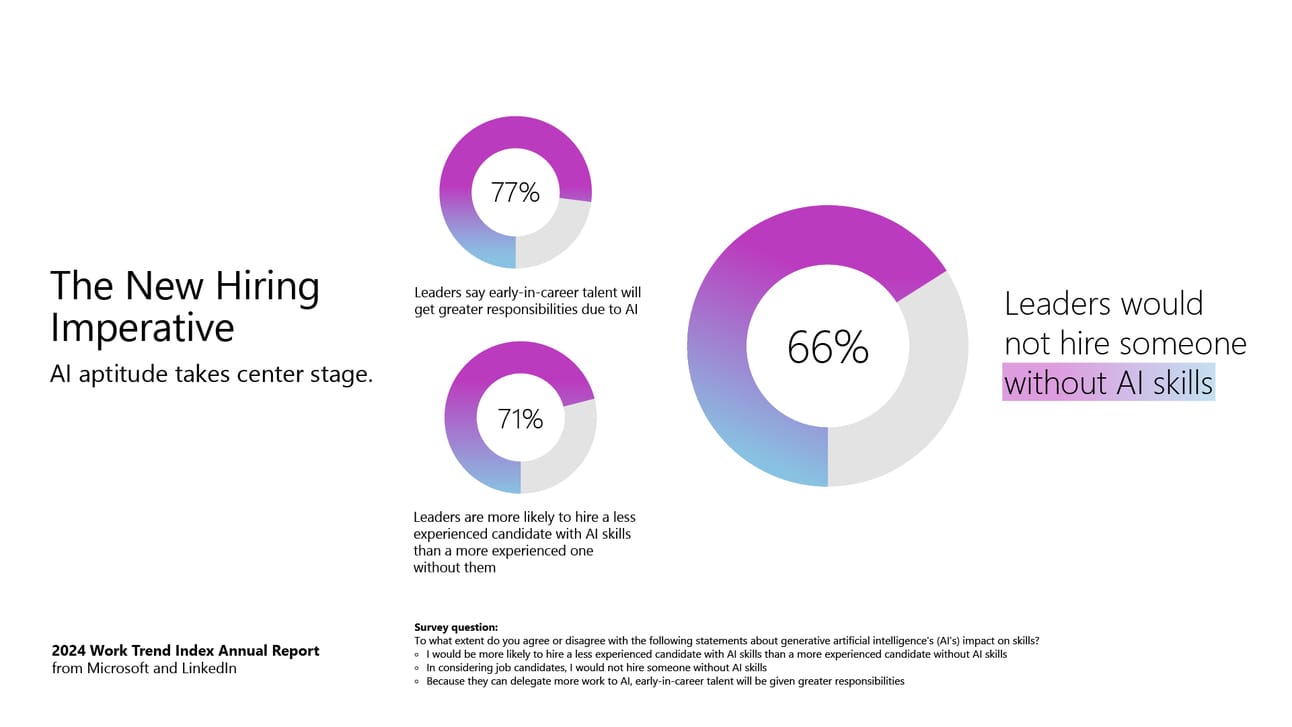- The AI-Powered Entrepreneur
- Posts
- How AI is Becoming the New Normal for Business Innovation
How AI is Becoming the New Normal for Business Innovation
Insights from the Microsoft-LinkedIn Study on AI's Transformative Role in Modern Workplaces

In the rapidly evolving business landscape, artificial intelligence (AI) has shifted from a futuristic novelty to a core component of workplace productivity and strategy. A recent groundbreaking report from Microsoft and LinkedIn offers a deep dive into this shift, showcasing how AI technologies are increasingly becoming integral to daily business operations worldwide.
Drawing on a comprehensive survey of 31,000 individuals across 31 countries, and analyzing labor and hiring trends, productivity data, and insights from Fortune 500 companies, this report provides a clear picture of AI's burgeoning role in the modern workplace.
AI Adoption and User Experience
The Microsoft-LinkedIn study reveals a striking surge in AI adoption among knowledge workers globally. Here are the key highlights:
Widespread Use: Currently, 75% of knowledge workers are utilizing AI tools in their roles, nearly doubling the figure in just the last six months.
Significant Benefits: Workers report that AI significantly enhances their efficiency and allows them to focus more on strategic and creative tasks.
Improved Productivity: The adoption of AI is not merely about using new tools but about transforming how work is done, enabling employees to manage their time better and prioritize core activities.

BYOAI Trend and Work Challenges
The flexibility and personalization that AI tools offer have led to a unique trend in workplaces across various industries, known as "Bring Your Own AI" (BYOAI). Here are some detailed insights into this phenomenon:
BYOAI Is Not Just for Gen Z: Across all age groups, from Gen Z to Boomers, a significant majority of employees are bringing their own AI tools to work. Specifically, 85% of Gen Z, 78% of Millennials, 76% of Gen X, and 73% of Boomers are using personal AI tools for their tasks.
Workplace Integration: Despite 78% of users bringing their own AI tools, this highlights a gap in organizational support for AI technologies, pushing employees to rely on personal solutions.
Relief from Work Pressures: With 68% of employees feeling overwhelmed by the pace and volume of their workload, AI tools serve as a crucial aid, helping manage these challenges more effectively.

AI’s Influence on Hiring Practices
As AI becomes more entrenched in business processes, its influence on hiring practices is becoming increasingly evident:
Requirement for AI Skills: A staggering 66% of leaders now consider AI skills essential when hiring, indicating a significant shift in job qualifications.
Preference for AI-Savvy Candidates: Reflecting a strategic pivot in talent acquisition, 71% of leaders prefer to hire less experienced candidates with AI skills over more experienced candidates without these skills, prioritizing AI proficiency as a key competitive advantage.

The Skills Shift
The demand for AI skills is reshaping the professional landscape dramatically:
Rapid Skill Transformation: It is projected that global skills required in the workforce will change by 68% by 2030, accelerated by the widespread adoption of AI.
Educational Response: There has been a 160% spike in non-technical professionals taking AI-related courses on platforms like LinkedIn Learning, signaling a strong move towards upskilling in response to evolving market demands.

Challenges in Strategic AI Implementation
Despite the enthusiasm for AI, many organizations face significant hurdles in integrating these technologies strategically:
Lack of Implementation Plans: 60% of leaders express concern that their organizations lack a comprehensive AI implementation strategy, which could hinder the effective utilization of AI.
Need for Strategic Adoption: There is a critical need for businesses to transition from merely experimenting with AI to adopting it as a core aspect of their strategic operations.
As we stand on the cusp of a new era in the workplace, defined by the rapid integration of AI, the Microsoft-LinkedIn study serves not just as a beacon highlighting current trends but as a roadmap for what lies ahead. Organizations are confronted with a transformative challenge: how to harness the potential of AI not just as a tool for operational efficiency, but as a cornerstone for strategic innovation.
Strategic Integration of AI
The onus is on business leaders to not only recognize the ubiquity of AI in modern workflows but to actively integrate these technologies in ways that enhance decision-making, creativity, and productivity. By moving beyond ad hoc implementations and embracing a comprehensive strategy, companies can leverage AI to unlock new potentials within their workforce.
Creating a Culture of Continuous Learning
As AI reshapes job roles and required skills, fostering an environment of continuous learning and adaptability becomes crucial. Organizations must commit to upskilling their workforce, ensuring that employees not only keep pace with technological advancements but become proactive participants in this evolution.
Reimagining Leadership in an AI-Powered World
Leadership in the age of AI requires a nuanced approach that balances technological integration with human insights. Leaders must cultivate a vision that incorporates AI into the core fabric of their organizational culture, encouraging innovation and maintaining a competitive edge in an increasingly digital marketplace.
Ready to Elevate Your Business with AI?
Navigating the integration of AI into your business operations can be a complex but transformative journey. If you're looking to harness the power of AI to enhance productivity, foster innovation, and stay competitive, we're here to help. Connect with us today to explore how our tailored AI solutions can bring your business ambitions to life. Schedule a consultation here!
Reply